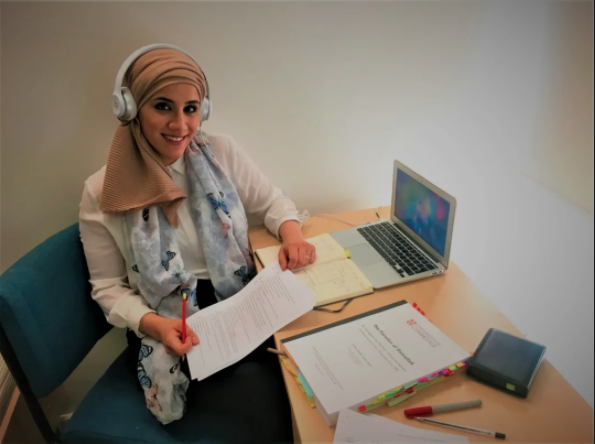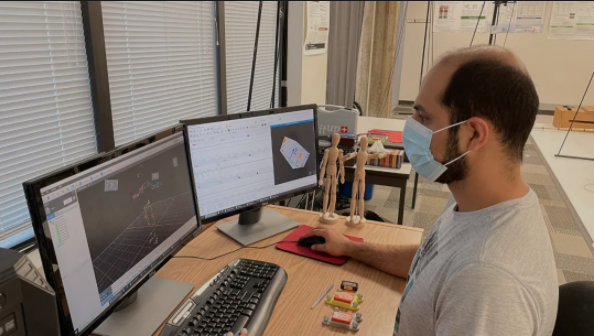尚乘教育 | 尚乘-滑鐵盧全球人才博士後學者計劃的最新動態
兩名研究人員剛剛開始了在滑鐵盧大學(University of Waterloo)的博士後研究 - 他們兩位均獲得尚乘-滑鐵盧全球人才博士後學者計劃的挑選,得到了獎學金及學者計劃下的支持。
Anwar Jaber和Milad Nazarahari將分別獲得尚乘-滑鐵盧全球人才博士後學者計劃下的獎學金,成爲尚乘學者(AMTD Scholars),爲期兩年,每年的研究補貼捐贈爲7.5萬加元。該獎學金是由尚乘集團董事長蔡志堅博士捐贈的300萬加元,連同尚乘國際主席Feridun Hamdullahpur博士,與諾貝爾獎獲得者、加拿大物理學家、滑鐵盧大學物理學教授Donna Strickland博士的共同贊助推動成立的。
尚乘學者計劃爲來自全球頂尖大學的新興世界級學者提供無與倫比的豐厚獎學金和職業發展機會,他們的顛覆性研究議程可以在這個無與倫比的世界內的多元生態系統中培育出具有全球競爭力的人才和科研成果。此學者計劃的設立志在吸引和支持這些傑出的學者、研究人員和發明家在科研創新領域,研究及開發能夠助力全球發展,並加速人才-研究和學術發展加總領域的推進,從而改善社會,貢獻於人類發展歷史上的進程。

尚乘學者:Anwar Jaber
Anwar Jaber將加入滑鐵盧建築學院,在那裏她將深入研究建築如何在面臨政治轉型和極端條件(如暴力政治和民族衝突)的城市中發揮重要作用。
作爲一名專注於建築和城市主義的文化及社會政治的學者,她將研究衝突下的記憶空間實踐,重點關注敘述有關戰爭、記憶和暴力的國家事件的博物館種類。
「在我的工作中,我研究建築在這些城市中可以發揮的添加作用,它們的城市形態,它們的創造條件,以及建築環境如何成爲塑造和吸收城市衝突的積極貢獻者,而不僅僅是反映它們」,她解釋說:「理解政治、權力和建築的相互作用對了解人們在衝突中和衝突後的生活方式至關重要,最終目的達到促進和平共融的世界。」
Jaber作爲一名巴勒斯坦人,在東耶路撒冷長大,並在巴勒斯坦Birzeit大學獲得建築工程學士學位,她的個人經歷激發了她對研究的熱情。
她說:「我之所以對飽受衝突和極端暴力困擾的城市感興趣,是因爲我在中東,尤其是在巴勒斯坦和以色列衝突下的耶路撒冷,成長、學習和實踐建築和城市規劃。」
她擁有英國劍橋大學建築與城市研究哲學碩士學位和建築學博士學位,她是劍橋大學建築系城市衝突研究中心的一員。
Jaber表示,她很感激和榮幸能夠獲得尚乘獎學金,並與她的導師Robert Jan van Pelt合作。Robert Jan van Pelt是建築學院的教授,也是著名的獲獎建築師和歷史學家。
「成爲尚乘學者是一個獨特的機會,將爲我的研究提供一個很好的基礎及穩定性的支撐」,她說。
Jaber還計劃在建築學院成立一個名爲衝突與城市的新研究小組,並在她在中東、歐洲和加拿大的人脈支持下,在學院和國際機構之間建立國際合作。

尚乘學者:Milad Nazarahari
今年9月,Nazarahari將成爲Arash Arami教授實驗室的新成員,在那裏他將繼續爲加拿大的中風患者開發既普惠又創新的技術。
他的研究將結合智能機器人和生物反饋,以提供有效和方便的中風後上肢治療。
Nazarahari說:「中風是成人獲得腦損傷(即殘疾)的主要原因,與日常生活能力下降有關。」
他解釋說,雖然在治療師監督下進行康復訓練等傳統康復訓練可以有效改善中風患者的運動功能,但由於成本高和治療師數量有限,廣泛的長期面對面康復可能不切實際。
Nazarahari在他的祖國伊朗的伊朗科技大學完成了機械工程的本科和碩士學位,然後來到加拿大,並於2020年從阿爾伯塔(Alberta)大學獲得了機械工程博士學位。
他最近是阿爾伯塔大學工程學院神經肌肉控制和生物力學實驗室的成員。
能夠成爲尚乘學者,Nazarahari期待與世界頂尖的生物醫學工程和其他相關領域的科學家合作。
他說:「滑鐵盧大學擁有加拿大最好的工程項目之一,即使不是最好的,可以爲這項研究提供所需的技術知識和工具。」
*****
備註:尚乘-滑鐵盧全球人才博士後學者計劃的申請者需要完成博士學位、或已滿足獲得博士學位的標準,沒有終身教職,每人只能申請一次。申請流程如下:
• 聯繫一名滑鐵盧大學的教職員工擔任導師;
• 教職員工提交背書表格;事務組工作人員聯繫申請人;
• 申請人聯繫推薦人提供推薦信;
• 申請人在線填寫並提交申請。
符合條件的申請者將接受由遴選委員會進行的評估,入圍的學者將被邀請線下或遠程面試。


